15/06/19 - 10/07/19
Total distance travelled: 11,200km
Tajikistan. I have never seen so many stars.
 |
| The road to Ak-Baital. |
We are frequently asked what our favourite country has been. It's impossible to choose as we have experienced highs and lows everywhere we have been (though our recent adventure through Bosnia and Herzegovina was actually all-round wonderful). However, if hard-pressed and forced to pick just one country so far that has simply blown us away, it would be Tajikistan. Olly is certainly championing Tajikistan as his favourite.
Tajikistan was the Pamirs. It was +4000m passes; it was snow and homestays, and sometimes it was struggling to breathe. It was Mars bars and nights under the stars. It was unrivalled hospitality, unrivalled scenery, hot bread, hot tea and occasional hot showers. For us, it was the epitome of adventure and we have longed to be back from the moment we left. Interestingly, it is not a country we would rush to call home though, but certainly one we hope to return to to adventure in again. (We're continuing to unpick those thoughts as we pedal.)
 |
| The open roads of Tajikistan (note the washboard) |
We spent almost a month in Tajikistan; 26 amazing and intensely challenging days. We cycled from the border with Kyrgyzstan at the Kyzyl-Art Pass to the border with Uzbekistan at Panjakent/Samarkand (a border crossing which has only in the past year re-opened to tourists and which the Central Asia Lonely Planet guide published in 2017 advised would likely never re-open). We pedalled a total distance of 1200km, some 500km of those were spent with just a river, the mighty Panj, separating us from Afghanistan.
| Reaching the top of the Kyzyl-Art Pass |
| The Marco-Polo sheep statue marking the border with Tajikistan |
In Tajikistan we also reached our highest point on the trip: 4655m above sea level on the Ak-Baital Pass: it took two emergency Snickers bars and a lot of pushing to get there. I think I also reached my lowest point of the trip in Tajikistan. I completely broke down as we climbed to the Koi-Tezek Pass at 4122m, our final +4000m pass in the Pamirs. I couldn't initially cry tears, only lean over my handlebars and sob great bellowing cries that started in my stomach and escaped from my mouth as incomprehensible heaves. Only when I was back on my bike, continuing to bump and swerve my way up to the top of the pass, did tears silently fall down my cheeks and my ability to speak return. The twilight descent that followed into the tiny, fairytale town of Jelondy, where we cycled almost right through the front door of the homestay which seemed made just for us that night, was perhaps the most important 18km of the entire trip for me. Remembering it now is causing my eyes to prickle with tears, it was so special. Perhaps you had to be there to understand why. Perhaps you had to be me.
 |
| When we could still pedal up the pass |
 |
| Hike-a-bike |
 |
The twilight descent. The first star on the right.
|
Our Pamir adventure breaks down into clear sections: Sary-Tash to Kyzyl-Art, Kyzyl-Art to Murghab, Murghab to Khorog, Khorog to Kalai-Khomb, Kalai-Khomb to Kulob, Kulob to Dushanbe, Dushanbe to Samarkand. In this blog post, I'm going to get us to Khorog, which has myriad different spellings as with most towns along the M41. Each aforementioned section took about four days to complete, three of which would be spent wild camping whilst the fourth and final night tended to be a celebratory homestay or hostel stay.
 |
| Homestay Sadat in Karakul |
We crossed into Tajikistan after slowly lugging our bikes up to the Kyzyl-Art Pass at 4280m. We took a few photos of the proud Marco Polo ram and then descended to the checkpoint before our fingers froze. Artem was greeted with a big smile and enthusiastic handshake when the guards realised that he was Russian, we got a friendly nod. The border crossing here is one of the highest in the world and so it pays to be upbeat and jolly to ensure a swift transition. In addition to a visa to enter Tajikistan, which cost about $50 per person, we needed a special permit called a GBAO - Gorno-Badakhshan Autonomous Region - which cost another $20, though if you are able to buy it in Dushanbe before you enter this eastern, autonomous region, it costs only $2! Our passports, visas and permits were checked at regular intervals along the Pamir Highway at military checkpoints.
 |
| Artem |
The smiling Dutch couple that we had met at the homestay in No Man's Land had lied to us! They told us that the worst section of our route for the day was the steep, muddy switchbacks that we had hauled our bikes up to the summit of the pass. They hadn't told us about the 15km of washboard road the other side of the summit which was a real test of our grit and determination.
Artem bumped on ahead and we lumbered on behind him. Artem had been recommended a homestay in Karakul and so that was where we were all heading that night. We told Artem to reserve us a bed if he got there before us, he did with an hour to spare. It was brilliant to arrive at Homestay Sadat, see Artem's bike in the yard and then be ushered into a room and be greeted with a friendly face and big smile.
 |
| Homestay Sadat |
Whilst painfully bumping along the washboard road, bordered to our left by a barbed wire fence on the other side of which was China, I pulled ahead of Olly. It was cold and so we were wearing lots of layers which made turning around and quickly looking over my shoulder hard work. I hadn't seen Olly in a while and so I stopped to wait for him. Just as I unclipped from my pedals, Artem disappeared over the brow of a hill. When I turned around, I was met only with silence and emptiness: Olly was no where to be seen. As an unwritten rule, we don't lose sight of each other, which is pretty sensible and seems like something the Scouts would advocate. I didn't immediately worry, presuming Olly would be just a few turns behind me. A couple of minutes very slowly ticked by before I felt my heartbeat start to increase and my mind start to whir. The Pamirs was not the place to lose break away from your pack, even if your pack consists of just two humans and their two heavy bicycles.
There was no way I was going to make good time by turning around and cycling and so after a few seconds of internal struggle, I decided to leave my bike and all my gear, take only my handlebar bag, which contains my most valuable items, and start running. Running on the washboard was not much easier than cycling on it and was definitely just as slow. I had no idea what to expect as I set off, falling into the holes in the road and desperately trying not to panic or engage with the scenarios that were playing out in my head.
Fortunately, I did not go too far before Olly appeared on the horizon. He was cycling and so I knew he must be mostly OK. I turned around to walk back to my abandoned bike, checking over my shoulder every couple of seconds to ensure Olly was still there.
When Olly reached me, I think my concern manifested itself as anger as I demanded to know where he had been. Olly had had to do an emergency poo stop for the second time that day. We've classified this episode of stomach upset as the "alti-poops", for this is how high altitude affected Olly. Despite our careful ascent and camping no more than 300m above where we had started the previous day, being at 4000m doesn't have no impact on a body used to hanging out at sea level or just above it. Olly had had to quickly pull off the road and had just managed to dig a hole in a tunnel used for drainage before... The vast, open, emerging lunar landscape meant that there had been no obvious place to poop and so Olly explained that the tunnel was his only option in lieu of exposing himself for all to see. Feeling better now, Olly for the aforementioned reasons and me because we were reunited, we set off once more for Karakul.
 |
| The road to Karakul |
In order to reach the tiny town of Karakul, described in the Lonely Planet guide as looking like a "post-apocalyptic settlement" which is scattered around a lake of the same name that is frozen for most of the year, we had to climb over another 4000m pass. It was less monumental than the previous pass, but afforded a brilliant view of the blue waters of Lake Karakul surrounded by snowy peaks. During the Second World War, the Russians detained German prisoners of war on the small islands in the middle of the lake. Although beautiful to look at, the thought of living, or surviving, here at 3960m was bleak.
Lake Karakul, Kyrgyz for "black lake", is described as having "brackish" water and so contains more salt than your average freshwater lake. It has only one known species of fish living in it, but is classified as an important bird area. The lake is an impact crater and is actually higher than Lake Titicaca in Peru and Bolivia which is widely regarded as the highest lake in the world. Lake Karakul usually thaws in May and I can only imagine it freezes over again not too long afterwards.
Our cycle to Karakul from our vantage point at the top of the pass took longer than expected. Following a swift descent, we had 20km of flat cycling into the wind to go before meeting up with Artem at the homestay to share stories over hot, home-cooked food.
Karakul had a real air of abandonment to it. Olly had read that Karakul does in fact get abandoned in the summer and so around the time that we were there. I was bemused and wondered why the locals would leave in what were surely the warmest months and the only time that the lake wasn't frozen. Olly continued to explain that locals travel to higher pastures - presumably with livestock, there were yaks in town and grazing by the lakeside - which must also only be accessible in the summer. All around the lake were snowy peaks that soared to heights above 5000 and 6000m. By the time we arrived at the homestay and unloaded our bikes, it was cold.
The warmth of Homestay Sadat, the window of the door of which was covered in stickers from the many other travellers who had passed through, hugged us hard. At first the heat was so welcome, but as we tried to fall to sleep it was stifling! I'm sure it was coal that was burning bright that night to keep us warm. I think it was a kind gesture for tourists keeping a room so warm, in the end we had to find it funny that at such altitudes we were sat in shorts and t-shirts (not quite, but if we had done, I don't think we would have been cold). Our cheeks were initially rosy when we came in out of the cold. By the time we went to bed, we were sweating. In the morning, we realised we had all got terribly sunburnt!
Artem was snug as a bug in a rug by the time we arrived: his roll mat and sleeping bag were already set up in a corner of the huge room that had been allocated to us. Artem had been in Karakul for about an hour and so had showered and been treated to chay and hvleb and was thus feeling pretty good. He said we should shower before we all sat down to have dinner together, waving away our protestations that he shouldn't have waited for us.
We enjoyed our second bucket shower of the trip that evening and the run from the room to the shower was very fresh! Almost the minute Olly returned from the shower, our host brought us dinner. We had it in the room, which comfortably could have housed four or five more people, sat on cushions around the round table in one corner instead of out in the dining area. I'm not sure why and nor was Artem, even though he and the host could speak Russian together. It felt like a real treat, though, being brought dinner in our bedroom and I think that is how the host saw it too.
We ate exceptionally well that evening to the extent that at the end of the meal I just lay down at the table, my feet resting on the cushion that I had been sat on. We had a five-course feast and bread and tea on tap! We had a delicious soup dish, like a lachman, to start, followed by salad and then a huge plate of pasta. I had really cleaned up my soup bowl with bread and so by the time I had finished my plate of pasta I was fit to burst!
It wasn't until breakfast the following morning (four fried eggs and lots of bread) that we realised that we had each eaten a bowlful of jam for dessert the previous evening. We had wondered about the three bowls of apricot "compote" for about 10 seconds before deciding that three bowls of jam would have been excessive at dinner time, thus we happily consumed them, believing them to be dessert, before entering into our food-induced haze and slumber. The joy of cycling in the mountains is that you can eat bowfuls of jam and it just doesn't matter! We were living on a simple diet of spaghetti and Snickers bars (independent of one another) during our time in the Pamirs yet I have never felt so good in my body.
Body confidence is something that I grapple with. I have promised to make peace with myself about my body before stepping back onto British soil. Admittedly, I have given myself something of a green light on this trip believing that if I don't eat I won't get far on the downhills, let alone up and over big mountain passes. However, I thought I might lose some weight. I have fluctuated only by a kilogram or two during our time on the road.
 |
| Descending the Gunt Valley from Jelondy to Khorog |
Romain, a French doctor whom we met in Dushanbe, tried to reassure me and gave me the whole "muscle is heavier than fat" spiel. I know, I know. He continued to tell me that over time, when used repeatedly, muscles become more slender, he said this is why marathon runners are so slight. He said "it would come". Merci pour l'effort, Romain. But, my tummy still bunches up over the top of my cycle shorts. I do not resemble some of the cyclists I see on Instagram, speeding along in their sports bras.
 |
| In Karakul |
Olly, on the other hand, has lost almost 10kg since we started the trip, something which is frequently commented upon. I don't like feeling that I have committed some injustice as a result, and that I should come home looking emaciated as if that is some kind of proof that I too have been travelling. Olly climbed a lot before the trip and has not done so since we left. I really do like food and eating (to the extent that I listed it under "hobbies and interests" on my CV), and I absolutely believe that sampling local fare is one of many ways to engage in, and connect with the cultures of the countries we are visiting. Olly too, and he always gets "the bigger half"! Our bodies are just quite different.
Furthermore, Olly doesn't like being told that he looks skinny. He said it isn't flattering to be told that, which is funny because I know that for too many girls this is the greatest compliment they can be given. Go figure. When I quizzed Olly further on the skinny thing, he said being told he looks skinny is as bad, in his eyes, as telling a girl she looks chubby. He said men are "supposed to be strong and muscular". Our respective suppositions are so damaging.
 |
| At 11,000km - happy with and in ourselves |
Anyway. Cycling in the Pamirs, all of this was far from our thoughts as we ate what we needed to to keep going. We were - bar Olly's intermittent alti-poops that inevitably had a bit of an impact on his weight - well in mind and body. That said, there wasn't heaps of opportunity to run riot in a supermarket and fill your basket with goodies healthy or otherwise. We bought what we could, when we could. It was bloody amazing.
 |
| Awesome selection of fresh fruit and vegetables at the container market in Murghab |
The day we left Lake Karakul, we all had only one thing in our sights: the highest pass in the Pamirs, Ak-Baital at 4655m above sea level. We had to commit to it quite early on in the day otherwise we would breach the recommended levels for ascending at altitude. It was exciting and a bit nerve wracking too! Artem was absolutely intent and because it was such a beautiful day - crisp, clear, blue skies - we decided to go for it too. (Just before the climb got really serious, we did start to doubt ourselves...)
 |
| Leaving Karakul |
As we left Karakul, we saw yaks grazing down by the lakeside as we glided along the smooth, paved road that stretched across the plateau. We met another cycle-tourist, a Swiss guy who lived in St Petersburg, he and Artem chatted a bit about bike shops in the city. Speaking with him motivated us all, though we none of us missed the fact that he told us he had been managing +100km days thanks to epic tailwinds. That only meant one thing for us...!
We continued to ride along a paved road and Artem pulled away in front. What was awesome in the Pamirs was the sense of community that we experienced; it was like no where else we have been on the trip (and I am now writing from Slovenia). I do not think this was purely a reaction to the murder of four cycle-tourists in 2018, though it likely had some impact. It felt like everyone on an adventure in the Pamirs was coming from a relatively similar place, especially the cyclists. However, we met lots of awesome motorcyclists and overlanders in weird and wonderful wagons too. Something ingrained in everyone was a desire to make sure everyone else was OK. Nodding, waving and shouting "hello" is practically law amongst cyclists anyway, but stopping, chatting and swapping notes along the M41 was like bumping into old friends every few kilometres. Very few other tourists didn't stop, and as we approached Dushanbe lots of locals pulled over too, many offered food or drink and some tried to offer us a lift even though we hadn't thumbed for one. It slowed us down a little in the best possible way.
| Artem just visible in the distance |
We spied Artem's bike expertly propped up using only the angle of the roadside for support and so we pulled over and had some lunch. Artem came running across a grassy plain having been taking photos of goats. We envied - again - how quickly and easily Artem fired up his cooker and he had a mug of coffee and bowl of porridge ready in no time at all. We had thought to fill a flask at the homestay and so didn't feel too left out! We swapped snacks and admired the vast, vast landscape. We were sat by a little stream, little because most of the water was frozen under snow.
Shortly after lunch the road turned to washboard and even stoic O Rowe complained, crying that he "hated" the road and hoped never to see washboard again in his life! We tried to stick the the edges of the road as much as possible, but juddering was ultimately unavoidable. Throw in a headwind and we had hours of fun.
Artem pedalled on ahead and before too long he became a speck on the horizon. It was quite cool to see him disappear around a corner and up, up on the Ak-Baital climb. I was suffering a bit with a headache which slowed us down further. I am a reluctant - and poor - tablet taker and I had read that certain drugs aren't good to take at altitude. Not wanting to risk anything I decided on the best course of action: emergency Snickers bar number one of the day.
The washboard road had been on a gentle gradient, but it eventually gave way to a steep, gravelly climb. We passed the Ak-Baital sign and mistakenly thought that meant that the summit must be in sight... surely just around the corner. No such luck.
We pedalled and pushed and pedalled again until we really couldn't catch enough of a breath to do anything but slowly trudge. My morale was plummeting and Olly's declaring that it was all so beautiful didn't help. It was, though. Even though outwardly I was huffing and puffing, I couldn't ignore the mountain tops which appeared to be within arm's reach and the clear stream trickling down the side of the road we were slowly walking up. I questioned whether we would ever experience anything like this again. Emergency Snickers bar number 2 was pulled from the food pannier and with that we continued to the top.
 |
| Slowly pushing to the top |
It was freezing cold and so we didn't hang around for long. It was also getting pretty late on in the day, nearing 1900. It was a little anticlimactic reaching the summit of Ak-Baital as there was nothing to signal this highest road pass in the Pamirs, the second highest in the world. We pulled on any remaining layers and calculated that we needed to descend 600m before looking for a place to camp. 600m of descent equated to about 7km in distance and so I kept a keen eye on my odometer. My brakes were screeching, as they have done now since somewhere in China, and the road surface was poor and so there was nothing speedy about our descent.
Olly had seen a water source labelled on the map and so that is what we aimed for. We found no water source, but I had called 7km and so we pulled off the road and walked our bikes over to a flat bit of ground surrounded by marmot mounds and in sight of the peak we were pedalling away from. We weren't really hidden, but with night falling, we decided that pitching up was the most sensible thing to do.
 |
| Our camp spot the following morning |
The following day we had a 70km descent to Murghab and so we didn't feel rushed to leave, even though we were wild camping. As I mentioned in the Kyrgyzstan blog post, one of the many reasons that the Pamir region is so brilliant is because it is one big campground. We waved at several 4x4s as they bumped up and down the road.
There had been no water the night before, just a huge dry river bed. However, overnight a small stream had formed, perhaps from snow melt. Olly filled our water carrier so that we could enjoy a hot drink on the mountainside. At the time, I was about halfway through The Northern Lights on a long overdue re-read of His Dark Materials trilogy and I sat with my nose in my book whilst Olly bimbled around. The Pamirs were the perfect place to get lost in Lyra and Will's worlds: my real life setting as magical as those described in the books. It did feel like I had cut a small hole in the world and stepped into another.
One night in Tajikistan, the night after we left Khorog, we were late setting up camp and it was already dark. We were camping in an orchard: cherry trees, apricot trees and pear trees surrounded us. The cow had been dragged away, but the children stayed to watch us. I was on The Subtle Knife by this point. As I pulled out the sleeping bags and blew up the air mattresses, blue sparks cracked inside the tent. It took me five seconds to realise that I was seeing static electricity from my swift handling of the sleeping bag liners and not Dust.
The ride to Murghab was great: a gradual gradient that required minimal pedalling and braking. We passed a graveyard where the headstones of jagged slates jutted unevenly into the sky. The sky went from a brilliant blue on the mountainside to a threatening, dark grey as we approached the town. Thunder and lightning cracked and then snow started to fall: not romantically, but in a storm. Olly had put his waterproofs on during our last stop and didn't wait for me to put mine on! This did give him a great vantage point for taking a photograph of me as I emerged from the storm clouds.
 |
| A sand storm brewing |
Just before the storm broke, and on the opposite side of the road to the cemetery, was a tiny settlement nestled into a mountainside. The landscape seemed barren and inhospitable, and yet a shepherd had walked his huge flock of goats and sheep across the road just in front of us. The earth was dry mud, sand and stones. We wondered how anyone survived here.
Arriving into Murghab felt momentous. We cycled along the main road and stopped at the Pamir Hotel: the hub for tourists in this remote landscape. Murghab was an interesting mix of colourful and tall Soviet buildings, the one-story ramshackle buildings we had seen in other towns and metal containers. The Pamir Hotel was a Soviet style building with a big glass front - the back of the building was far less refined.
 |
| Approaching Murghab |
 |
| Around the back of the hotel |
 |
| The Pamir Hotel |
It was quite crazy to be in this bustling hotel after our night on the mountainside. We were pleased to see a familiar bike propped up outside of it. We had hoped we might catch up with Artem the day before and camp with him again. When he told us that he had waited an hour for us at the top of the pass - and remembering how cold it had been - my heart broke a little. He shrugged away our apologies and said he had been welcomed into a yurt and spent the night with a family. It definitely helps to speak Russian in these parts! We knew the yurts he was referring to as we had been waved at enthusiastically as we passed the two white domes that morning, they were maybe 30km from our camp spot.
When we arrived, the hotel manager was away and so a lady brought us tea, biscuits and toffees. We sat in the warm reception area, peeling off layers and feeling giddy at our Pamir adventure so far. Now that Ak-Baital was conquered, surely it was all downhill from here...
We chatted happily to the many other tourists who bumbled in and out of the reception before retiring to a room and taking our first "normal" shower in a while. It was cold in Murghab: I wore a lot of layers and slept in my sleeping bag under a blanket at night.
Two Australian cycle-tourists joined us in receptions and one of them dominated conversation for the rest of the day. It was a bit much. None of us could get a word in edgeways which was disappointing as this was to be our last night with Artem. We had planned a rest day and so had he, meanwhile the Australians told us they were moving on in the morning. When I woke up to find Artem loading up his bike and the Australians sitting drinking tea, I felt gutted. I love chatting and sharing stories, but the previous evening had been overwhelming and draining: when we got back to our room, I had asked Olly if we could just lie in silence.
Saying goodbye to Artem was sad as we had really enjoyed his company the past four days. He told us to "just come to St Petersburg" and grinning we told him to "just come to the UK" too. We're determined to go and see him in the summer when the water is switched off and bucket showers are the order of the day. Artem is an adventurer through and through and aged 30 has visited some 60 of the world's countries. I hope he'll add another to his list and come to see us soon. Spasibo, Artem and safe travels.
 |
| Artem off to the lakeside to snap some yaks |
On our rest day in Murghab, we kept to ourselves. We enjoyed warm, homemade, tandoor bread for breakfast with cherry jam and afterwards we took a walk around the container market. I was so surprised to find bananas and aubergines so high up, so far away. We had seen a Vauxhall Zafira, the car par excellence in the Pamirs, piled high with sacks of onions and potatoes on the day we crossed into Tajikistan and so assumed produce must be brought here from Osh in Kyrgyzstan or Khorog, the next big town along the M41 that we would arrive at in a few days' time. In the evening we sat at a traditional low table on cushions on the floor along with three cyclists from the Basque Country. They were heading in the opposite direction to us and so we swapped notes before heading to bed.
From Murghab it took us four days to reach Khorog, the so-called capital of the Pamirs. These four days of cycling were through the iconic, lunar landscapes of the Pamirs. We had made the somewhat agonising decision to stick to the M41 and not divert off onto the Wakhan Corridor: a mostly rough, gravel road that runs alongside the Wakhan river which is the natural border between Tajikistan and Afghanistan. It is supposed to be exceptionally beautiful albeit an often tortuous ride that results in something breaking regardless of your mode of transport. I constantly felt like we had to justify our decision to stick to the main road, which so many referred to as "the easy option". The road conditions were often better than those along the Wakhan Corridor, but it wasn't an easy ride by any means.
 |
| Leaving Murghab |
It was a blow to my confidence then when Olly said that he would probably have chosen the Wakhan had he not been with me. I admit that gravel roads are not my favourite when lugging around a 45kg bike, but I'm confident - now, at least - that I could have done it. Olly said it was a team decision, but for the first time on the trip I felt like I might be holding him back.
A fair few times on this trip people have asked Olly how I (Lorna) am coping, or whether I'm keeping up. These people can PO for multiple reasons. Firstly, it is 2019. 2019! And still there is the assumption that man is strong and woman is weak. For what it's worth, I summit most hills before Olly. He has me on the flats, and on the downhills his confidence far exceeds mine, but on the hills something happens: I find my rhythm, I never competitively pull ahead, I just pedal hard. Sure, sometimes this is because Olly has stopped to take a photo or pee, but often it's not. "Olly's bike must be heavier then", I can hear some people thinking. It is, yes, by about 5kg. And what? Why can't we accept that a girl might reach the top first? It's 2019.
Also, it's 2019 and still there is the assumption that man is strong and woman is weak. By asking Olly how I (Lorna) am coping, the opportunity for Olly to discuss how he is feeling is immediately taken from him. What if he is not coping? Not keeping up? It is so much harder to start the conversation if someone has already shut it down. Male mental health is a big deal and something that many are brilliantly addressing, but which many others still feel uncomfortable discussing, or refuse to accept, because of the assumption that man is strong and woman is weak. (Olly would like me to state that he is doing fine, but supports the point.)
One cyclist we met tried to engage Olly in some friendly male (read: sexist) banter about being unable to leave his girlfriend at the bottom of a hill because they are riding a tandem. My eyes widened and I snapped that there was no need to worry about that in our case because I get to the top of the hill first. He nudged Olly and said, "you're carrying all of the heavy stuff then".
I have watched in awe and wonder as the babies of friends sing, dance, laugh, cry, eat, run, live with sheer abandon. When does it happen that girls start to feel inferior to boys? When does it happen that boys learn they shouldn't cry? When we tell them. When we act that way. If a boy gets to the top of a mountain first on a bicycle, it is not because he's a boy. If a girl has a breakdown on a mountainside, it is not because she's a girl. It is 2019.
After the inexplicable heaving sobs the day we cycled to Jelondy, I got back on my bike and only then started to cry tears. The only thing I said, potentially bellowed, was, "I rode my own bike! I rode my own bike!" Me and Olly have never been in competition with each other, we each try to support the other by playing to our respective strengths. I'm a crier and never been a swearer. I realised that day how useful swearing could be though, as a release. Ask us both how we're doing, not if I'm keeping up or if Olly is taking it easy on me. If you do, I might just tell you to...
It was a powerful place, the Pamirs.
Both me and Olly are really happy with the route that we took through the Pamirs and wouldn't hesitate to recommend it. The M41 was an epic ride and we survived Central Asia without so much as a puncture.
From Murghab we cycled out onto the moon. As we left the container town, we were joined by a young boy on a far-too-big bike, but he was keen to keep up, nay, race us all the way to the police checkpoint. Just before the checkpoint a little band of youths joined hands to make a road block. Initially we found this quite endearing, but by the time we left Tajikistan we were quite bemused by some of the behaviour from children that we had encountered.
On our final day of riding in Tajikistan, a similar road block was formed, but this time by a bigger bunch of bigger children who had been sat by the roadside selling apricots from buckets. They initially whooped and hollered at us in a friendly way and then formed the roadblock laughing. As we approached, they ran towards our bikes and started to grab at us. I find this terrifying and would like to recall the "smacking incident" in Laos when a troop of boys starting smacking me as I pedalled past them. Our bikes are really heavy and we are clipped in to the pedals: falling off hurts. In addition, our bikes are blooming expensive bits of kit that we don't want to have to go replacing, especially in Central Asia where it isn't quite so simple as nipping to the town's bike shop.
The children started screaming "den'gi" den'gi", "money, money", and I pulled on my brakes to avoid causing damage to someone. I asked the children to get off my bike at which point one very vocal boy thrust his hand right under my nose and demanded money. I shook my head, firmly said "no", and cycled away. Fortunately for me, Olly was now heading in their direction and so they didn't cling onto my bike or run after me. Olly's approach was to keep cycling at speed. It's a dangerous game of chicken. I heard the same vocal boy yell "DEN'GI" at Olly. The next thing I heard was said boy, he was maybe 9 or 10 years old, scream "F**K YOU" as Olly clearly cycled straight past. Someone out there has a lot to answer for.
As we approached the police checkpoint, the boy turned around and cycled back towards Murghab and the little roadblock disbanded. We cast one last look at the town before pedalling away from the police and further into the wilderness. We didn't encounter many people for the next couple of days. Shepherds nodded or raised a hand from the hillsides as we passed, 4x4s and trucks honked their horns and waved in a friendly manner.
As we were going past one such shepherd, three dogs attached to his flock ran towards us. We apply the same logic each time a dog or dogs approach us: stop. Olly is convinced they love the chase, which seems likely. These three, dirty-white, scraggly dogs stopped as soon as we did and then walked towards us cautiously. We could tell they weren't after our flesh and so we started to talk to them. They were inquisitive and probably after food. They sniffed around, but backed away whenever we stretched out our hands to try to pet them.
One dog turned around and headed back after a couple of minutes. Olly said we should get going again - it was cold and an increasingly strong headwind was blowing. As we set off, two of the dogs set off with us.
Before too long, the young puppy decided he had had enough, but little Sheep, as we called her, kept running. We were both cycling slowly enough for her to be able to keep up, despite the fact we also wanted her to turn around and go "home", afraid she would go too far and get lost. She was most loyal to Olly who stopped every now and then, waved his arms around at her and told her to go back. She sat politely by his side, looking around each time he did this.
The wind was intense and our bikes and bodies felt so heavy battling against the strong gusts. The road was quiet and empty and the lunar landscapes were so vast; it was on this day that I felt the most disconnected from "the world". Oftentimes since, I have longed to be back there; it felt like the definition of "nowhere".
We had plugged in our headphones in a bid to take our minds off the wind. I had the Desert Island Discs podcast blaring into my ears at full volume and I still couldn't hear it! I have spent more time compiling my Desert Island Discs playlist over the course of the last fourteen months than I have anything else. Maybe one day it will prove to be a good use of all of this "thinking time".
Our progress was so poor that our morale suffered a significant blow. We decided to find a place to set up camp sooner than we had planned, reasoning that we would make up the miles quicker the following day without the brutal wind. The prospect of the wind being just as bad the next day did not seem to cross our minds...
We pulled off the road and set up camp about 10m from it. We were in full view on a grassy plain. There was nowhere to shelter from the wind and nowhere to hide and so we just stopped and put up our tent. Sheep was still with us and so when Olly went over to a stream of snow melt, he called her to go with him to ensure that she got something to drink. She was the most wonderful, grotty dog. She didn't pester us as we put up the tent nor try to steal our food as we cooked. She sat, she rested. We couldn't resist giving her a little bit of bread to eat. The first thing we did in the morning was check if she was still there.
She was.
However, we now didn't know what to do! We half-seriously discussed the logistics of taking her home; we might never own such an obedient and loyal dog! We packed up and pushed our bikes back onto the road. Initially, Sheep stayed curled up asleep: she had run a long way with us the day before. We delayed leaving, watching her. We had to go. We turned around once and she wasn't there. We said it was for the best. We turned around twice, just to check, and there she was. We still haven't admitted to each other how pleased we were.
When we had woken up we were so relieved to find that the wind wasn't howling a gale. Our tent wasn't flapping wildly, we could hear ourselves think and all felt calm. Of course, the moment we got back onto the road, the wind picked up and blew in our faces all the way to Alichur, the town on "the roof of the world", to which the Pamir region is sometimes referred (so is Tibet), where it very rarely rains.
As we approached Alichur, a tiny cluster of houses and shops and then two great, stonking Soviet buildings painted bright colours, a little stream ran alongside the road. It made a delightful babbling sound. The closer we got to the town though, the more clogged with litter the stream became. It reminded me of a page from Al Humphreys's book, Mood of Future Joys, in which he discusses a similar situation in a country in Africa. He talks about how you can gauge how long it takes a rich man to drink a can of Coca-Cola based on whereabouts on the way out of town he has thrown the can out of the window.
At some point on our way to Alichur, where were stopped at a guesthouse right at the end of the town for some hot food and shelter from the wind, we had lost Sheep. We had watched her run off several times to chase bright, orange bundles of fur across grassy plains; the marmots always managed to duck down into their burrows just in time. We had been cycling slower than we normally would do in order for her to keep up, though we each vehemently denied doing so. Eventually, on a downhill, Olly said we should pedal and not look back. We were gutted and felt like horrible humans. It was a small relief to see a picture pop up on Instagram from our cycling compadres @spokeandworld with none other than Sheep in it. Kat and Lewis were about a week/ten days ahead of us on their Pamir adventure: Sheep must have been a cycle-tourist too in a former life.
The next day we cycled to Jelondy and it was a memorable day. Olly had said, "not too far today", which I think is not a good omen. We had 60km to cycle and some 800m to climb and so on paper it was a reasonable looking day. It started with us trying to use the old road that led to the disused building and which ran parallel to the main road. It was a slow start because of how broken the road was. It was superhero-movie cracked down the middle and so after far too long struggling along, we pushed our bikes back up onto the main road and went from there.
Olly gives a good account of the day which involves "going up a bit and then down, and then up a bit and then down". Not long after setting off we passed the turning for the Wakhan Valley, or the Wakhan Corridor, a 350km, mostly dirt road which follows the Wakhan River which forms a natural border between Tajikistan and Afghanistan, the mountains of the Hindu Kush rise high on the Afghan side. Blink and you would miss the tiny sign pointing towards this remote and rugged valley that claims so many bike bits and even the starter motors of 4x4s. It also captures many hearts and has certainly captured our imaginations for a future adventure (on a gravel bike and with a bike packing setup!).
The gravel road to the Koi-Tezek pass was really tough after a day of "up a bit and then down, up a bit and then down". Even harder was reaching the top and then realising that the descent was going to be even worse: we continue to be surprised when we see that glorious tarmac does not await us. As I said, I realised there really is a time and a place for swearing on that mountain. When I'm sad, I cry, when I'm happy, I cry. Moved: cry, grateful: cry, angry: cry. I think if I'd just roared a few expletives it might all have been OK.
It certainly took us longer than expected to reach the top of that arduous climb, our final +4000m pass of the Pamirs. It took a lot from us, but gave a lot back too. After a combination of cycling and pushing for 10km, we reached the top as the sun was starting to go down. We had 18km to go to reach the town of Jelondy where we had seen on the map that there was a homestay. We had intended to camp, but with the light fading and in need of a little comfort, the homestay - if it was there - was where we were headed. Although our many mapping apps were reliable in the Pamirs, it was a place of community where word of mouth was certainly more so. We hadn't heard from many passing this way of a homestay in Jelondy and we had been out of contact for a few days too. We hoped for the best.
We stood at the summit for a couple of minutes contemplating our next moves. The sky was darkening and before too long would become the richest shade of indigo I had ever seen.
We had little choice but to descend and head for the town because we were too high to camp and in addition, there was no where to do so: sheer drop to the river to the left, high-rising mountainside to the right. Delighted at having made it to the top of the pass, we set off in better spirits than we had been in reaching it.
 |
| Snickers and sobs |
 |
| Even in the harshest of landscapes, flowers bloomed |
For 5km we slowly struggled and bumped down the rough, gravel road and our renewed optimism started to wane once again. However, when we hit the smooth tarmac that then guided us all of the way to Jelondy, we flew.
Or Olly flew whilst I stopped and started overwhelmed by the beautiful Gunt Valley. The deep purple sky twinkled with stars: one by one they appeared in the sky as if guiding us. In the fading daylight and increasing moonlight, waterfalls glistened and danced in a way I had never seen before. Behind us, the mountains' snowy peaks dazzled where the moon's glow illuminated them: the soared into the sky, but felt protective and not threatening as they had done before. And we flew. Down and down that mountain we went, twisting and turning, gliding. I felt tears prick my eyes again. This was worth all of the struggle.
We were surprised to see lights of a different kind twinkling in the distance. Jelondy was lit by electric lamps that bobbed in the breeze. Their warm glow was so welcoming and felt festive. It was so wonderful to see after the harsh conditions that we had grappled with just a few kilometres in the other direction. The closer we drew, the more enveloped we were in the warm glow. Small, precise irrigation channels criss-crossed all over the small town and made such a friendly babbling which we followed right to the door of the homestay. We had seen the sign from a few metres away, gently lit by a lamp. The relief we felt. We turned left and pulled on the brakes at the gate to the house. A father and his small children were out in the yard, playing quietly and smiled when they saw us as if they had been waiting.
We were ushered inside and any angst we had been feeling quickly dropped away. We were safe, we were well. Jelondy was so calm and soon we were too. We sat on cushions around the small table, each having laid out our sleeping bags on a bed in preparation for a much-needed slumber. Eggs, bread, tea and biscuits were brought to us and we relished them and started to recount the day. It was already fading into a hazy memory and we laughed when before we had cried.
I stepped outside to go to the toilet and to brush my teeth and found the man, the father out there too. He explained that he had seen us in Murghab a few days previously. I felt our journey had been precisely what it needed to be to reach this very moment. I looked up at the sky and there wasn't a speck that didn't sparkle silver. "So many", I said, without averting my gaze from the stars. "It's the Pamirs", the father said, spreading his arms wide and smiling. Silly me, of course it was. Expect nothing less.
Our room had been kept so warm that it had been a little hard to fall to sleep. However, we woke in the morning feeling energised, which was a good thing as we had 130km to go to reach the city of Khorog, the capital of the GBAO region. This would be our longest day on the bikes (and remains so - just - to date). Despite that fact, we took our time with breakfast which was a feast resembling the kind of spread that is put on for children's birthday parties! We started with eggs, bread and tea, but whilst eating, plate after plate of additional goodies was brought to us: biscuits, bonbons and a whole Swiss roll that Olly can't forget. We had two pots of tea and sat chatting happily on our cushions before finally peeling ourselves off them and reloading the bikes.
Jelondy marked the beginning of the end of our time in the high Pamirs. The day we left Khorog, Olly laughed at me for putting on my thermal top and tights: temperatures soared as we descended into the lowlands and left the snowy peaks further and further behind. We've only recently started wearing our winter gear again.
 |
| Leaving Jelondy |
We left the fairytale, haven town after a quick stop at the shop which was opened especially for us! It was run by the same lady who ran the homestay and so that was very handy. And then, we started our descent.
Winding our way down the Gunt Valley provides one of the most picturesque, scenic and wonderful days cycling that we have had.
We celebrated reaching 100km with a Bounty bar and the remaining 30km are something of a blur. We had been making fairly good time for saying we hadn't left Jelondy until about 9.30 following our epic breakfast. It had also rained intermittently as clouds shrouded certain mountains and fell low over certain parts of the valley. In addition, we had paused countless times to try to capture the beauty that surrounded us. It also wasn't a completely downhill day and we pedalled through lots of small villages that lined the main road, the M41.
Just after the Bounty bar we had 10 difficult and slow kilometres on a narrow, winding, gravel road which did not do much for our morale. We cycled single-file, barely uttering a word to one another: it was "heads down" and a serious withdrawal was made from our inner reserve.
We were relieved when the tarmac returned and so pushed hard as the light was starting to fade once more. It was frustrating to have to undergo a final police check, which was carried out at a slovenly pace, just before a hill that led out of the valley and into Khorog. It was a busy road, by now, and I felt unconvinced that I would make it up it.
We were rewarded at the top by a view over the river and some of the town under a pink sky. We didn't stop for too long though, keen now to stop for good that day.
We cycled through the town in the growing darkness, which I've come to realise isn't my preferred way to first see a new place. Or perhaps more so, it isn't beneficial for the new place for me to first see it in the dark. We pedalled right into a street fight between some local youths and whereas before, at work, I would have felt confident striding into the middle of it in a bid to break it up, now I stood by quite helplessly wondering where we were. It was a stark contrast to our arrival in Jelondy the night before and I pined for the dim, swaying lamps and the stars.
We finally made it to The Pamir Lodge which was right at the opposite end of town to the one we had entered, and up a significant hill. The Pamir Lodge has entered into Pamir folklore and many cycle tourists and over-landers who pass through stop there. It is family run business and everyone spoke great English. When we inquired after food, we were told, "we don't really do food, only pizza". Bring it on!

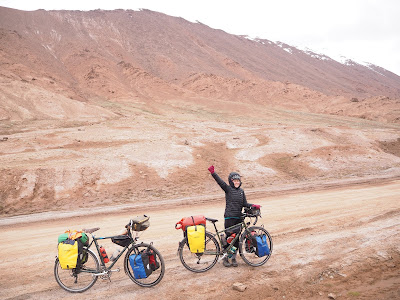




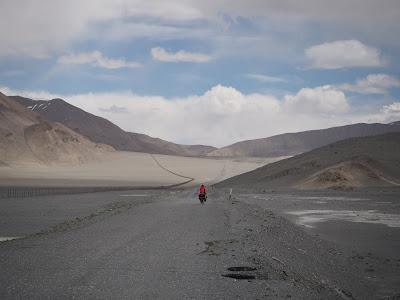





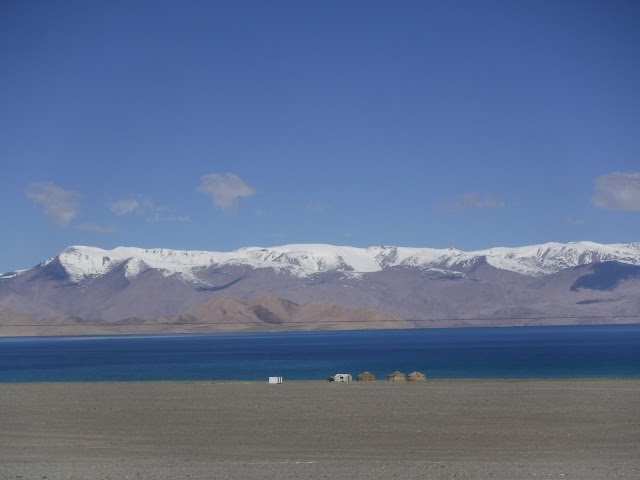











































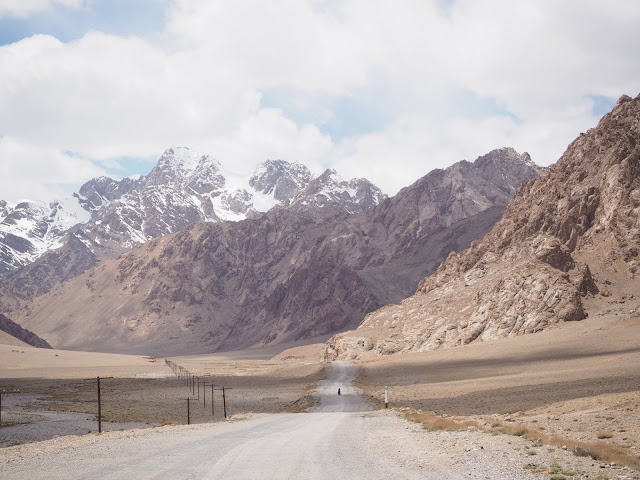

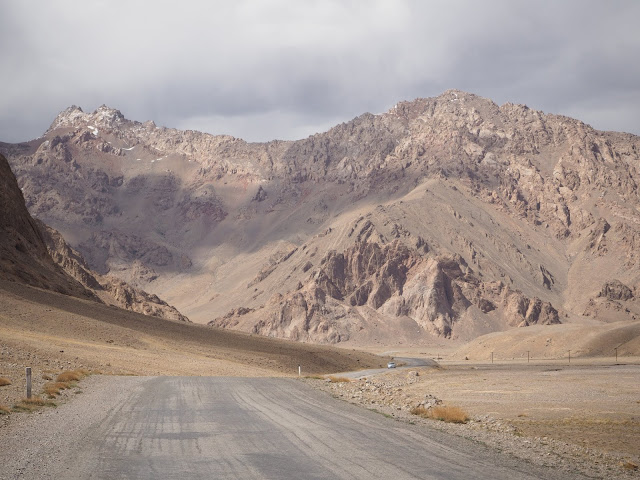

























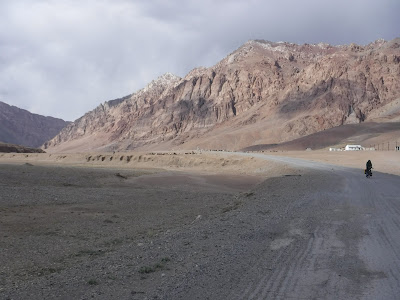















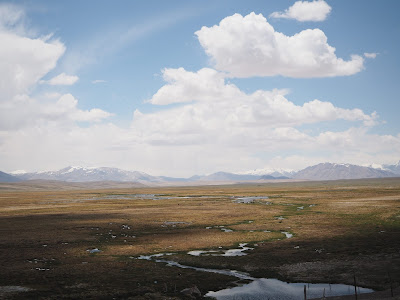
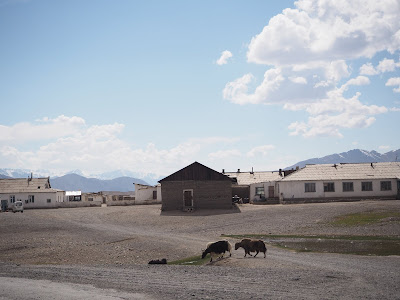















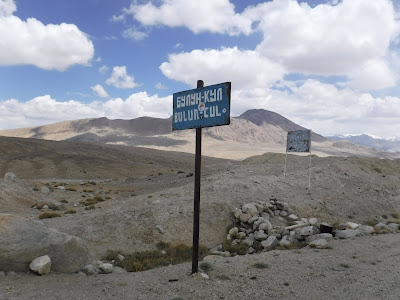










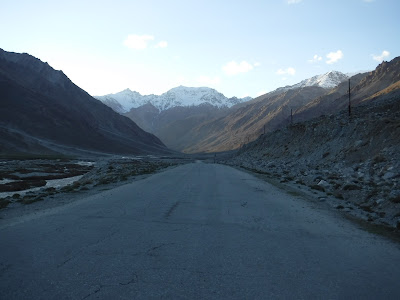


























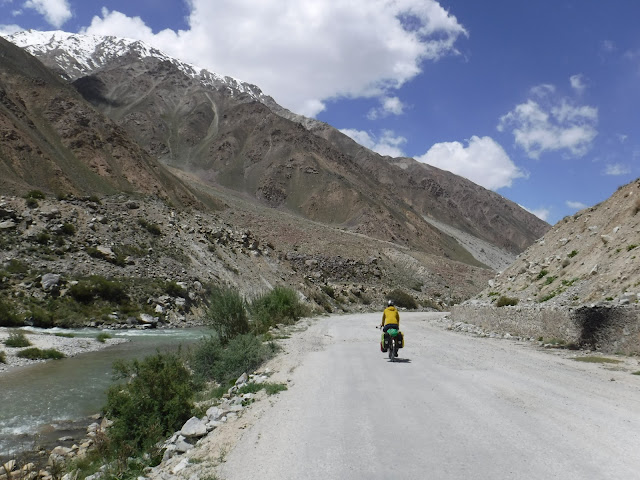
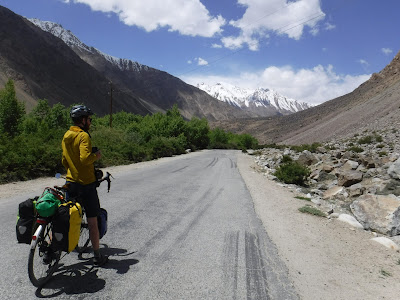


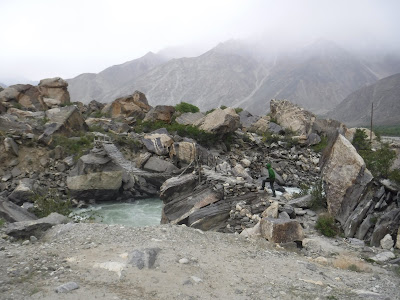












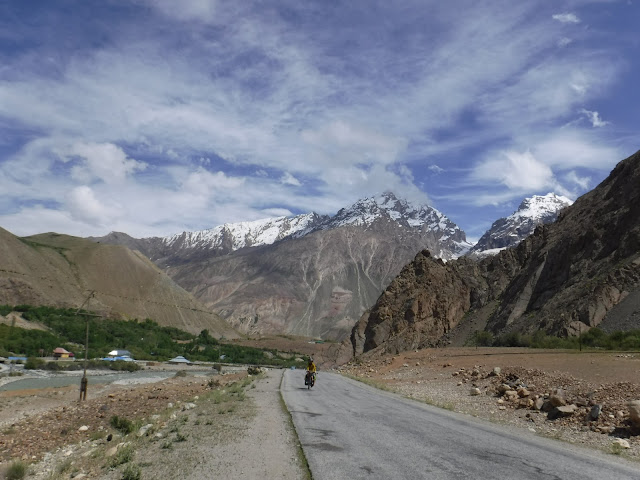

















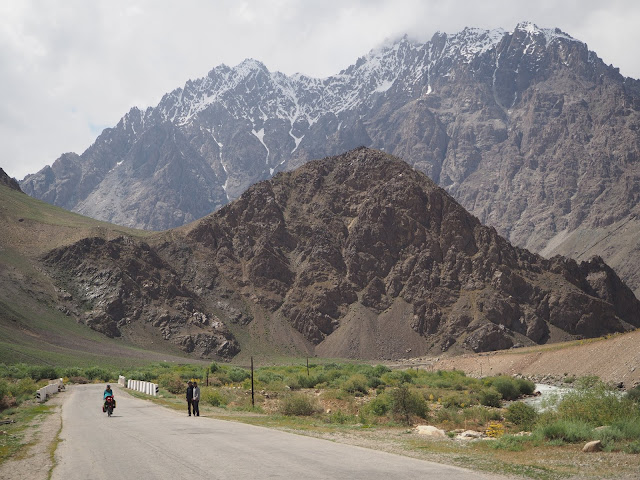





Comments
Post a Comment